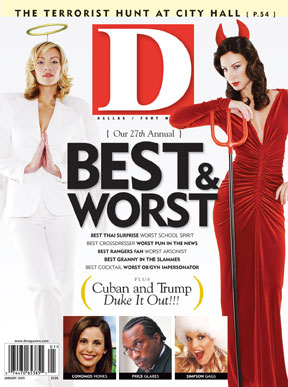 |
| Tracy Rowlett |
No North Texas journalist has received more honors than Fort Worth native Bob Schieffer. In fact, there is very little the 67-year-old newsman hasn’t done in his career that has spanned 45 years. Recently his alma mater, TCU, announced that it would rename its journalism department the Schieffer School of Journalism, with a ceremony planned for March 8. But things have not been so rosy inside Schieffer’s beloved CBS News, which has suffered from the fallout of a flawed report by Dan Rather about President Bush’s National Guard service.
Rowlett: Did you anticipate Dan Rather’s decision to step down?
Schieffer: Well, I had anticipated it, but Dan has just been around so long, and has been a part of CBS News for so long, that even though I expected him to retire someday, it still came as a shock. Before all this controversy came about, Dan had talked about joining 60 Minutes full-time. But it’s like having a big tree in the front yard, and suddenly it’s not there. When they come and cut it down, you are still surprised.
Rowlett: Do you link his decision to the controversy over the National Guard story?
Schieffer: I wasn’t privy to the discussions, and I just don’t know if there was any connection. But I do want to say that Dan was always fearless in going after the news. He always wanted to be where the story was. I think he is to be admired for that. He compiled an enormous body of work, and I think that speaks for itself.
Rowlett: Rather, and CBS, are perceived by critics to be politically liberal. Why does that perception persist?
Schieffer: Well, sometimes we have to deliver news that people are not ready to hear and don’t want to hear. I think that causes bad feelings. But most of the reporters I know try to play it down the middle. I think what drives most reporters is to get the story first and to get it right before their competitors get it. We all have biases, and we all have a point of view. But we are also professionals. And I don’t think we could survive very long if we just gave the news from one point of view. What we are trying to do is to get as many people as possible to watch our broadcasts, and if we veer one way or the other, we are just going to reduce the number of people who watch our broadcasts. If people don’t believe us, we will cease to be. I would also note that during the Clinton controversy, the news organizations that drove that story were The New York Times, The Washington Post, and the networks, news organizations that some on the right would call liberal, and yet they were the ones driving this story. So, it is not some secret agenda or preconceived belief that causes most reporters to pursue news stories.
Rowlett: You’ve known Dan Rather since the Kennedy assassination. Are his critics correct when they call him a liberal?
Schieffer: I don’t know what Dan is, although he says he is not a liberal. He is just driven to get the story before the guys at the other organizations get it. And I’ve always found that’s what drove Dan Rather.
 |
| FACE TIME: “I think Sunday mornings are the smartest time in television,” says Schieffer, who moderates Face the Nation. “We try to keep the volume down and the content up.” |
Schieffer: Frankly, they had no other choice. If people don’t believe us when we broadcast a story, then we will cease to be. Dan was quick to apologize, and he admitted he’d made a mistake. CBS executives brought in people from the outside–Lou Bacardi, the retired editor of the Associated Press, and former Republican Attorney General Richard Thornburgh–people of unquestioned credentials. CBS gave them free rein to find out what went wrong and to publish it. But CBS had to do it because this was not something you could put a Band-Aid on. CBS had to take measures to ensure that something like this never happened again.
Rowlett: You had nothing to do with the National Guard story, but did any of this criticism impact you directly?
Schieffer: Yes, it did, to be perfectly frank about it. I had been selected to do the third and final presidential debate, and when this controversy became public, there were several web sites that orchestrated an e-mail campaign to have me removed as the debate moderator. They said CBS should not be allowed to have any part in these presidential debates. There were literally thousands of e-mails to the debate commission demanding that I be removed as the moderator. The debate commission decided that I had nothing to do with any of this, and the White House and the Republican National Committee said that they believed I would be fair and square as moderator. So no changes were made.
Rowlett: Your brother, Tom, has been a longtime associate of the president’s, most recently serving as Ambassador to Australia. Are people aware of that connection?
Schieffer: Well, I have never made any secret of it. I am very proud of my brother. But we are two adults with separate careers. He was George Bush’s business partner in the Texas Rangers, and it was a very successful business. The president asked him to serve as our ambassador to Australia, but my brother is also a Democrat, I might point out, and politically has often been on opposite sides of an issue with the president. But obviously he is a friend of the president’s and supports the president’s foreign policy. He is also my best friend, but he doesn’t ask me about CBS business, and I don’t ask him about ambassador business. I told the White House early on that I wanted to be treated like any other reporter, and I didn’t want anyone on the president’s team to give me any special favors. And they have lived up to that, I will say.
Rowlett: So Tom has never asked you what went wrong with the CBS story?
Schieffer: No. He doesn’t ask me about Dan Rather, and I don’t ask him about George Bush. But my feeling about all that is that if there is full disclosure, if people know that I have known George Bush since before he became governor, then I don’t see a problem there. If you have been around as long as I have and you don’t have a personal relationship with most of these people, then you are not a very good reporter. But they are professional and I am a professional. They know they can’t get any special favors from me, and I certainly don’t expect any from them.
Rowlett: TV news is losing viewers. Over a million people a year are tuning out of network news. Why is that?
Schieffer: Well, if you add up all the channels with newscasts, I’m not sure it’s true that television is losing news viewers, although it is true that the networks are. But I think that is only natural. When we started off in this business, you might have three network stations and two independents. Today, you may have 200 channels available to you when you turn on your TV. You can find news delivered up in any style and from any point of view, and it’s oriented to specific demographics. That shouldn’t have surprised us because that’s what magazines did some time ago: sports magazines, women’s magazines, and so on. What we have is a whole lot of op-ed pages out there right now on the television dial. But you may be getting only one point of view if you only watch one channel. So you need to watch several stations, just like you need to read two or three newspapers, if you really want to be informed.
Rowlett: You recently wrote a book about the history of Face the Nation, the Sunday interview program you moderate. Is it fair to say that such informational shows represent the best that TV has to offer?
Schieffer: Well, the remarkable thing about it is that it is essentially the same show that it was when it debuted in 1954: no bells, no frills, no whistles. We just sit newsmakers down at a table and ask questions. And I think there are still viewers out there who want content and are not interested in who can scream the loudest. They want the news put into context. Our philosophy is that if we can get the information out there, the American people are smart enough to know what to do with it. I think Sunday mornings are the smartest time in television. We try to keep the volume down and the content up. We don’t try to have a “gotcha” contest. And so much of what passes as political discourse on television these days is nothing more than that–just a “gotcha” contest. And I think it is not only unenlightening, it is also destructive.
Rowlett: What is your favorite Face the Nation moment?
Schieffer: Well the program I am proudest of was the show we did right after 9/11. We expanded to two hours and had reports from ground zero and the Pentagon. We talked to the Secretary of State, the two New York Senators, and rescue workers. The country was reeling at that time, and I think we did a very good job of informing the nation under some very difficult circumstances. 9/11 was the hardest story that any of us ever had to cover. It was not about other people, it was about us. Our families had been put at risk. This was an attack on our country. We had friends at CBS who were killed. Our reporters who went immediately to ground zero had, without exception, near death experiences. This was an emotional and difficult time, and Face the Nation did a very good job of putting that information out there. So that is the program I am proudest of.
Rowlett: I know you have had some serious health problems…
Schieffer: Well, I got over this bout with bladder cancer last year and it looks good on that front. My health is excellent today, as far as I know. As my doctor said, “For someone who is in the shape you’re in, you’re in good shape.”
Rowlett: And what are your future plans? Do you plan to retire anytime soon?
Schieffer: No. I plan to keep doing this for a while, although sometimes when you retire is not up to you. Other people make that decision. I think CBS would like for me to keep doing this beyond my contract expiration, which is at the end of next year. I’m even going to start a new book pretty soon, and this one will be about Lyndon Johnson, which is something I have always wanted to do. It will be my most ambitious project yet.
Get our weekly recap
Related Articles

The One Thing Bryan Yates Would Save in a Fire

New York Data Center Developer Edged Energy to Open Latest Facility in Irving



